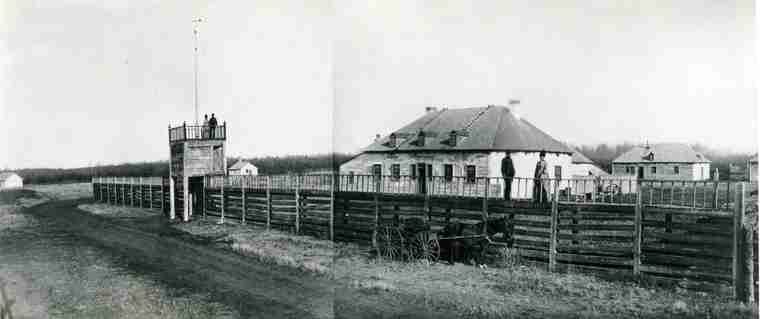
- Details
- By Jenna Kunze
The toll of unmarked graves holding the remains of Indigenous children in Canada increased by 54 yesterday following the announcement from Keeseekoose First Nation in Saskatchewan.
The Nation found the graves using ground penetrating radar at the sites of two former Indian Residential Schools, with 12 found at Saint Philips and 42 at Fort Pelly, both less than ten miles from the Nation’s headquarters.
“Knowing that we had unmarked graves in our community, in our common areas where we drive every day, that we walk every day, we pass by them never realizing that there was graves there— that's got to be the most hurtful part,” said Chief Lee Kitchemonia in a broadcast press conference yesterday. “The way they were hidden.”
Want more Native News? Get the free daily newsletter today.
The discovery comes weeks after Williams Lake First Nation (WLFN) announced their findings of at least 50 Indigenous children found on the grounds of St. Joseph’s Mission Residential School, a former Residential School in British Columbia. Since last May, over 1,400 Indigneous children's remains have been found across Canada, including 215 in Kamloops, 182 in Cranbrook, and more than 160 found on Penelakut Island–all in British Columbia–and 751 in Marieval, Saskatchewan.
Assembly of First Nations national Chief RoseAnne Archibald spoke at the press conference via Zoom on Tuesday. She said that survivors have always known what was happening in residential schools, but were rarely believed until the first mass grave was discovered at Kamloops last year.
“And so when we make these recoveries, that's proof, that's long overdue proof that a genocide has occured in Canada,” she said. “What's really difficult about this is that the recovery of our children is just beginning. We are at the beginning of over 130 institutions across Canada.”
Following Tuesday’s announcement, Canadian Prime Minister Justin Trudeau wrote on Twitter acknowledging the “profoundly heartbreaking” discovery.
“It is by telling the truth that we will honour and lift up the memory of those who never came home from these so-called schools,” he wrote.
Chief Kitchemonia said the tribe hasn’t completed surveying the school grounds due to winder weather.
“Are there more graves out there? We don't know that,” he said. “We got caught up in the snow. So the numbers that we have here today are the numbers we're presenting, but it also opens up the door for more questions.”
For support or resources in Canada, a National Indian Residential School Crisis Line is available 24/7 for those directly or indirectly impacted by the residential school era, and can be reached at 1-866-925-4419.
Tell Us What You Think
More Stories Like This
50 Years of Self-Determination: How a Landmark Act Empowered Tribal Sovereignty and Transformed Federal-Tribal RelationsLancaster County to Recognize Conestoga-Susquehannock Tribe on Massacre Anniversary
How the Gaming Economy Helps Tribes Navigate Shifting Policies
Prairie Band Potawatomi Nation Fires Executives After ICE-Related Contract Sparks Outcry
Tlingit Haida Tribal Business Corporation Clarifies Federal Contracting Work
Help us defend tribal sovereignty.
At Native News Online, our mission is rooted in telling the stories that strengthen sovereignty and uplift Indigenous voices — not just at year’s end, but every single day.
Because of your generosity last year, we were able to keep our reporters on the ground in tribal communities, at national gatherings and in the halls of Congress — covering the issues that matter most to Indian Country: sovereignty, culture, education, health and economic opportunity.
That support sustained us through a tough year in 2025. Now, as we look to the year ahead, we need your help right now to ensure warrior journalism remains strong — reporting that defends tribal sovereignty, amplifies Native truth, and holds power accountable.
 The stakes couldn't be higher. Your support keeps Native voices heard, Native stories told and Native sovereignty defended.
The stakes couldn't be higher. Your support keeps Native voices heard, Native stories told and Native sovereignty defended.
Stand with Warrior Journalism today.
Levi Rickert (Potawatomi), Editor & Publisher

